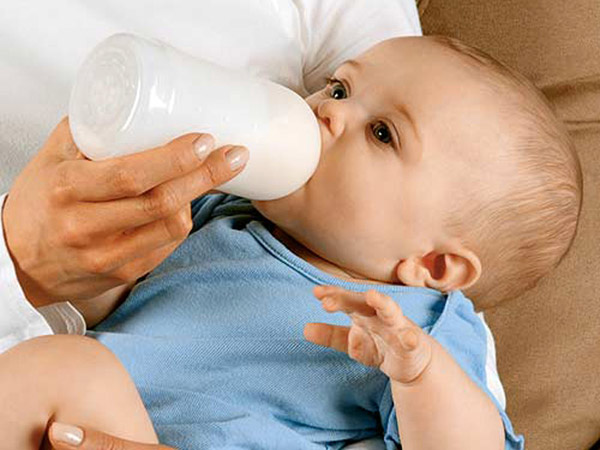
In addition to the rather important factor is the brand, the choice of formula milk also requires mothers to grasp quite a lot of other information. Maybe some of the things you learn will bring interesting surprises
Formula milk affects the baby's "output"
For babies, everything they throw out is a direct reflection of what they eat. If a mother gives her baby different formula, the results will be different. Even, the transition from breastfeeding to formula milk also changes the properties of the baby's feces. Besides, the growing up also makes the smell, properties, volume and color change significantly.
All of these changes are simply the body's adaptation to the nutrients passing through the baby's digestive system. Formula milk contains ingredients that are different from breast milk, so of course there will be different results. However, many parents worry when their baby's feces become smelly, darker and drier than the stool when only breastfed.
Formula digesting is different from breast milk
The composition of most milk, including breast milk, contains protein, including whey protein and casein. Breast milk contains a lot of whey, making it easier for babies to digest, while formulas containing more casein should digest more slowly. And so, bottle-fed babies will be fuller for longer and mothers can extend the distance between feedings.
Each baby has its own unique energy needs, characteristics and sleep patterns. As a result, there are some babies who, despite formula feeding, the times of hunger and awakening are the same as when breastfeeding. Therefore, your baby may ask for less formula when breastfeeding, or still take the same amount when breastfeeding. If there are cases like this, mother also do not worry too much.
Babies may be allergic to formula
Most babies digest easily with formula. But it is not excluded that some babies show signs of an allergy to milk proteins, known as milk protein intolerance in infants. Some other babies are lactose intolerant .
Based on the baby's stool, parents can guess whether the baby's digestive process is unstable or not. Babies can be allergic if their stools have blood or mucus. This manifestation may also be associated with inflammatory bowel disease.
Milk allergy is also manifested by symptoms such as diarrhea, vomiting, anorexia, or a rash on the skin and sometimes irritability, constant crying. Of course, every mother knows that the baby's constant crying is not the only cause is a milk allergy. However, parents should not underestimate this manifestation.
If your baby is allergic to cow's milk formula, mothers should consult their doctor to switch to soy-based milk instead. If your baby continues to be allergic to soy protein, the doctor may recommend hydrolyzed milk. With this type of milk, the protein has been broken down to make it easier for the baby to digest.
Each baby has a different need
It is not uncommon for a mother to see her baby suckling less milk than her neighbor's baby. Basically, each baby has its own unique nutritional needs. Formula milk is not the right universal key for the needs of all babies. Therefore, with a fixed amount of milk, having a baby will feel full but having a baby is not enough.
Mother also noticed that the baby's milk demand also depends on each time of day. It is similar to how mom eats a lot in the morning and eats less at night. Therefore, don't be surprised if your baby sucks 120ml of milk this time and 180ml the next time.
The baby's needs can be affected by many factors, but basically, mothers still have to ensure the principle: When the baby cannot eat solids, the mother needs to feed the baby with milk every day, at the rate of every 150ml. per kilogram of weight. Thus, if the baby weighs 3kg, the mother will give the baby about 450ml / day; And if the baby weighs 5kg, the baby will drink about 700ml / day.
And don't forget to regularly contact your doctor to monitor your baby's development and make sure everything is going well.
Formula milk has the same basic ingredients
Entering a supermarket or grocery store, mothers are easily overwhelmed by the sheer number of baby milk types with all brands and weights. Perhaps the thing that mothers most concerned about and reassured is that all milk cans are clearly marked with ingredients and full of the most important nutrients. The last part that mom is wondering is which option is best for your baby? In fact, all types of milk contain the same basic ingredients.
Particularly for DHA, an ingredient that is not essential but related to children's cognitive and visual processing abilities, may be absent in some brands of milk. Therefore, when buying milk, mothers often pay attention to choosing milk with DHA supplementation.
In addition, dairy companies also prepare different types for each child's special needs. Milk for premature or underweight babies contains more calories than conventional formula milk; infant formula with gastroesophageal reflux with added rice or concentrates; Soy-based milk or hydrolyzed milk for children with milk protein allergy or intolerance ...
If couples still wonder about choosing milk for their baby, the safest way is to consult a doctor. Doctors can help you choose the formula that best suits your baby's needs. At the same time, parents should also refer to other parents' experiences for helpful advice on choosing milk for their babies.












